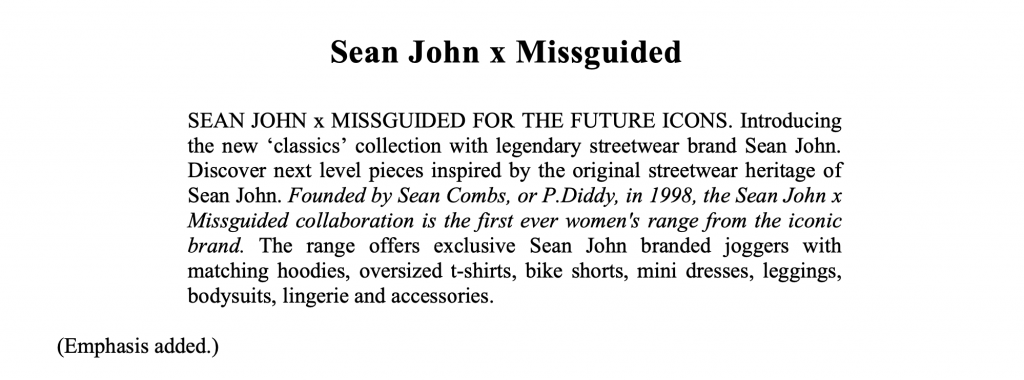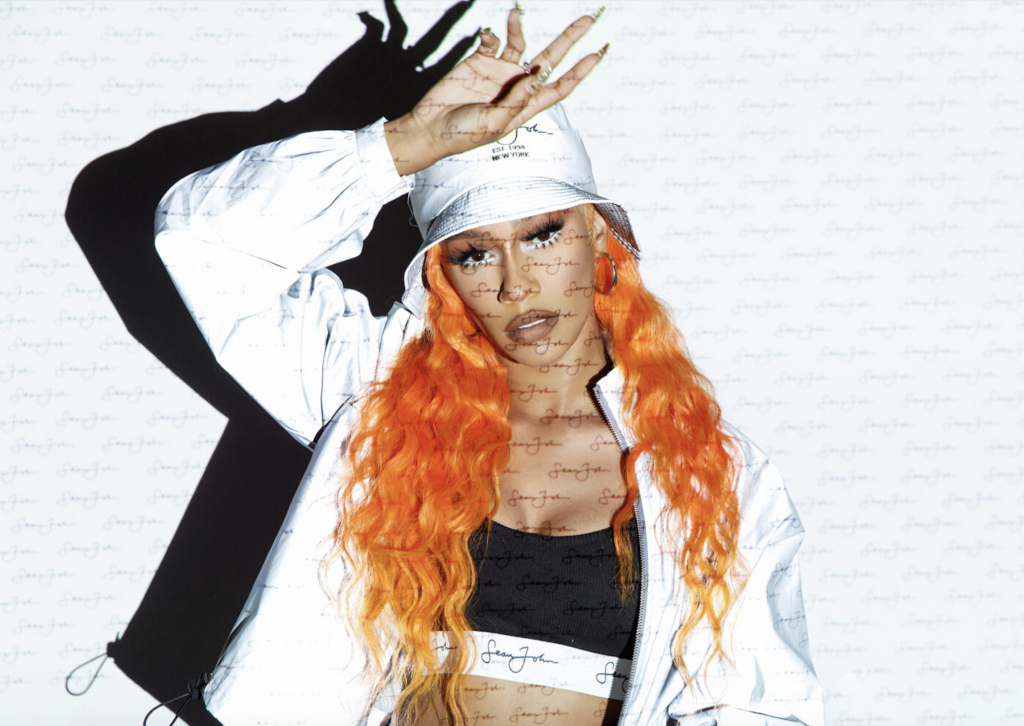The Sean John brand may be inextricably linked to Sean “Diddy” Combs, but that does not mean that the company behind it can use the likeness of its famous founder without his authorization. That is what Combs asserts in the complaint that he filed against GBG Sean John LLC, GBG USA Inc., Missguided Limited, and Missguided USA (collectively, the “defendants”), accusing the companies of “using and exploiting [his] name, image, likeness, and persona … without his approval, permission, or consent,” and thereby, causing consumers to “mistakenly believe” that he is affiliated with an apparel collection that they launched.
According to the complaint that he filed in a New York federal court on February 4, Combs claims that in the midst of “achiev[ing] a level of success, recognition, and fame in the music industry that few ever attain,” he expanded his career beyond the music industry to fashion, launching the Sean John clothing brand in 1998. Under his watch, the brand “rose to critical and commercial success as a premier lifestyle brand in the U.S. and around the world” before it was sold to brand management company Global Brands Group (“BGB”) in November 2016. (At the time of the deal, it was reported that Combs would “retain a minority interest – believed to be around 20 percent – and [would] continue to be involved in the marketing and promotion of the Sean John brand.”)
Things seemingly went south last year, according to the complaint, when GBG entered into a license agreement with UK-based fast fashion brand Missguided “for the creation and distribution of [a] collection bearing the Sean John trademark.” Combs asserts that the license agreement was entered into without his “knowledge, approval, or consent,” and more than that, he argues that he never granted GBG or Missguided “the right to use his name, image, likeness, or persona in conjunction with the GBG collection,” nor has he ever “endorsed the GBG collection, which is branded as ‘Sean John x Missguided.’”
Nonetheless, “before the GBG collection launched on September 29, 2020, it received significant media attention,” with articles containing quotes attributed to Combs in which the rapper and entrepreneur appeared to be endorsing or otherwise connected with the collaboration. For instance, the complaint points to a quote published by 356retail.co.uk, in which Combs allegedly states, among other things, “Over the years, women have supported [Sean John], worn our iconic velour tracksuits and have been asking for a collection, so here it is!”
The problem: “Mr. Combs never uttered the above statement attributed to him.” As such, Combs alleges that the defendants “jointly authored and approved the quote falsely attributed to [him] and never provided the statement to [him] for his review and/or approval,” which he says that they did not do because “they knew, or should have known, he would have refused” to endorse the collaboration. Combs claims that because his “name, image, likeness, and persona are an extremely valuable asset, he zealously guards his publicity rights and carefully evaluates whether, and to what extent, those rights may be exploited by others.”
In addition to allegedly falsified media quotes, Combs claims that the marketing messages on the Sean John and Missguided websites include erroneous information about his connection with GBG and the Missguided collaboration given that GBG “was not founded by Mr. Combs, and he is not responsible for or involved in the ‘Sean John x Missguided collaboration.’” And all the while, Combs also takes issue with a 40-second advertisement for the collaboration that “promotes the apparel using … Mr. Combs’s name, image, likeness, and persona.”

With the foregoing in mind, Combs states that he “does not challenge the defendants’ right to use the Sean John trademark” in connection with the Missguided collab since GBG is the owner of trademark rights in the “Sean John” name as a result of its acquisition of a majority stake in the Sean John brand in 2016. Instead, Combs is calling foul on GBG and Missguided’s “decision to leverage a fabricated quote they created and then falsely attributed to Mr. Combs, and to use [his] name and other monikers to create the false and misleading impression that [he] is the decision-maker behind the designs and creation of the GBG collection.”
According to Combs, the defendants’ unauthorized use of his name and likeness, including “false or misleading representations of fact,” come in furtherance of their quest “to promote and sell the items in the GBG collection because they understand that associating it with Mr. Combs will significantly increase sales and profits.”
In light of the defendants’ alleged failure to “take immediate and effective measures to correct the misperception and belief by the public that Mr. Combs endorses, sponsors, approves of, and is affiliated with the GBG collection,” Combs sets forth claims of common law right of publicity, and statutory right of publicity” under California state law. He is seeking monetary damages, and injunctive relief barring the defendants from “using, exploiting, or displaying [his] name, image, likeness, voice, or persona in any way … now or in the future, without [his] written consent or permission.”
Are Trademark Rights Enough?
Interestingly, the case – which is not the first of its kind to be filed against Missguided (the brand was sued on right of publicity grounds by Kim Kardashian in 2019) – sheds light on one of the many issues that individuals could face in connection with labels they founded after a sale of the company has occurred. Combs’ claim that GBG and Missguided have relied on his persona in marketing the collaboration to help boost sales seems to suggest that: 1) consumers associate the Sean John brand with Combs, and that connection drives demand for the company, and 2) in such a situation, the most immediate trademark rights amassed in furtherance of a brand acquisition might not be the end-all, be-all when there is a famous founder or affiliated figure at play.
In other words, it appears that while GBG maintains exclusive rights in the Sean John brand and affiliated trademarks, and almost certainly can craft marketing messages about the company’s origin story (including its famous founder) as long as they do not border on suggesting that an affiliation exists, GBG appears to be left wanting, namely for the ability to legally claim closer, endorsement-esque ties to its ultra-famous founder. This issue – and the delicate balance that it calls for – is likely to continue to arise as an increasing number of celebrities launch brands either under their own names and/or in which they act as the primary spokesperson.
“You have to make something damn good and differentiated,” Michael Yanover, the head of business development at Creative Artists Agency, told the New York Times late last year in connection with the boom in celebrity beauty brands. Oftentimes, at least part of that differentiation centers, of course, on the celebrity at play, which inevitably boasts a huge base of fans that are eager to buy into things that that particular individual endorses.
Tapping into such demand via their own ventures, whether it be apparel companies or beauty brands, “has the potentially huge prize down the road of an I.P.O. or a deal like [Kylie] Jenner’s,” Courtney Rubin wrote for the Times in November, referring to the $600 million that cosmetics titan Coty, Inc. paid for a 51 percent stake in the reality mega-star’s company. (Coty has since followed up the Kylie Cosmetics deal with a purchase of 20 percent of Kim Kardashian’s KKW brand in a deal that values the 4-year old company at $1 billion). The Wall Street Journal noted around that same time that Kylie Cosmetics is “part of a wave of fledgling cosmetics lines capitalizing on” – and thus, depending on – “celebrity founders and social media-driven marketing.”
Given that these celeb-affiliated companies derive significant value from their famous founders operating in a central role (making them a critical marketing asset of the company), questions – and potential issues – abound if/when such individuals opt to ultimately sell off the company that bears their name and/or is so closely linked to their likeness, and move on to new ventures, as Combs appears to have done here. While the transfer of trademark rights in connection with the sale of a celebrity-founded and fronted label, and the subsequent operation of such a brand is not without a road map (it can a bumpy one if the company is an eponymous one), such a deal also requires an examination of right of publicity issues, namely, the right to use an individual’s name, image, and likeness in commercial settings in connection with the brand even after they have parted ways.
This is likely to continue to prove a critical consideration as celebrities rush to leverage their fame by way of consumer goods brands, with the Sean John case potentially serving as a mere jumping off point for future squabbles.
*The case is Sean Combs v. GBG Sean John LLC, et al., 1:21-cv-00996 (SDNY).











